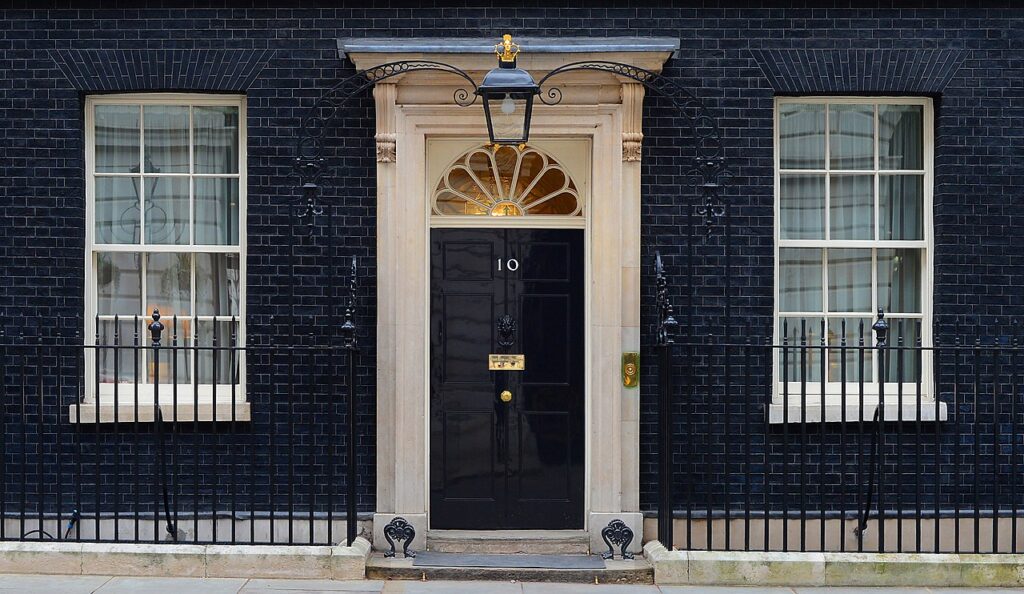
Prof Matthew Johnson is a refreshingly straight-talking, no-nonsense North Easterner with his finger firmly on the pulse of public policy research.
The son of welfare dependent parents has seen his head turned and his opinion reshaped by compelling evidence that reinforces the view that financial and social security comfortably trump austerity and economic streamlining when it comes to creating a safe, secure and trusting society.
“I got very lucky,” admits Matthew, Professor of Public Policy and Chair of the Common Sense Policy Group at Northumbria University. “I think I’m probably the last generation of people who were able to grow up with parents who were welfare dependent — and who are still welfare dependent — and who were able to have a normal life, to own a house, to get a good job and to earn a good salary.
“I can’t imagine people who grew up on our income being able to be successful these days, in the same way as I was. I feel real guilt about this because, after the financial crisis and the 2010 General Election, I bought entirely into the idea of austerity.
“I, like many others, thought that reducing the deficit, reducing expenditure and streamlining the economy was a good thing that would leave us in a much better position in the long term. I was wrong.

“I say I was wrong because I didn’t really understand the circumstances that often make it difficult for people to get on in life. And I think one of the good things about working with evidence is that the evidence has persuaded me that I was wrong.
“Now I think about my circumstances and think about what would have helped me more. The answer is greater income and more security — not my parents having a perverse incentive not to work.
“They knew as soon as they got healthier, more active, better, they would be off their incapacity benefit and they’d be off their disability benefit and we’d be left without the income to support our family. I’ve had a Damascene conversion on this and I think it’s good to admit it.”
Matthew and colleagues at Northumbria University have joined forces with fellow academics, policymakers, third sector leaders, community representatives and people with lived experience to develop Act Now: A vision for a better future and a new social contract under the umbrella of the Common Sense Policy Group.
Forward-thinking members include Danny Dorling, Professor of Human Geography from the University of Oxford, Kate Pickett, Professor of Epidemiology at the University of York and Jennifer Nadel, Co-Director of the UK think tank, Compassion in Politics. All are committed to creating a fair, equal and inclusive Britain through developing and influencing redistributive policy.

“The first 100 days are very, very important for the new government,” adds Matthew. “What we’ve seen is 14 years of declining living standards, the same solutions being presented and the same solutions failing.
“If we are to have change then there needs to be a clear indication of that in the first 100 days. It might not be that there’s anything that can be done immediately to alleviate the profound insecurity that people, particularly in the North East, feel around their finances.
“But there might be scope for symbolic action with regard to tax reform and that could include: taking the burden away from paid employment and moving to things like wealth tax; increasing forms of taxation on those who can afford it; and creating a pathway through to investing in the kind of jobs, the kind of energy security and the kind of social security that people, particularly in our region, need so dearly.
- Read more: Child poverty, care, inequality and integrity — they’re on my wish list too
- Read more: Collaboration is the only way forward
“The Starmer government is going to have an incredible task on its hands. But it’s important that they act quickly and efficiently in order to drive the narrative for the next parliament.”
Matthew feels the autumn budget will be key when it comes to setting the tone for the next five years. Whilst accepting that the Conservatives have left the country in an ‘economic mess’, he feels the financial proposals set out by Labour in their 2024 manifesto fall short when it comes to dealing with the scale of the challenges faced by the UK.
“There is an opportunity right at the beginning of the new parliament to make a clean break with the past,” he insists. “It’s time to stop tinkering around the edges and make a big pledge to the country that significant change is on the way.
“I’m not a member of any political party and, in that respect, I don’t have any skin in the game in terms of party politics. But my sense is that we need a party that’s secure in its majority and able to take brave decisions without the risk of being held to ransom by factions within it. I just hope that Labour has got the courage of its convictions and that it really does take the steps needed to rebuild Britain.”

So what should those steps be? Matthew and the co-authors of Act Now: A vision for a better future and a new social contract have outlined a series of key policy proposals with a focus on effective implementation and costing. These include:
- A basic income for all — a means of securing a society that makes the rest of a new social contract possible, including by reducing pressure on health care and disruption caused by transition to net zero
- A properly funded green new deal and nationalisation of energy and water — essential to producing national wealth and independence
- Nationally owned and operated health and social care
- Early years and educational investment — critical to reducing pressure on the criminal justice system and increasing productivity to support the transition to a new economy
- Building to navigate through the housing crisis while gradually removing the state-led transfer of wealth to private landlords and speculators
- Transformation of infrastructure through targeted, regional control of transport
- Democratic reform to control lobbying and corruption — benefiting progressive parties
- Funding an expansive programme of change through wealth, carbon and corporation taxes and increasing the tax base, yield and productivity sufficiently to create a Britain that leads the world in quality of life, equality and security within 10 years.
In many respects the new report echoes social economist Sir William Beveridge’s 1942 plan for post-war Britain with proposed reforms targeting an end to the era of austerity and the cost-of-living crisis, while also addressing the public’s appetite for change.
Act Now: A vision for a better future and a new social contract represents an ambitious wishlist but Matthew is keen to dig down on the detail.

“Let’s look at basic income first of all,” he adds. “It’s a largely unconditional cash payment that’s made to all adult citizens but the most important aspect of it is that it goes to those who are in work as well as to those who are out of work.
“It closes the fairness deficit and it gives citizens security, predictability of income and the knowledge that that income will be there when they need to spend on basic essentials. Just like the NHS, I think basic income can be a source of great national pride.”
So what of the so-called ‘green deal’? “What we’ve seen with privatised utility companies is that they provide services which are of a lower standard and often cost a lot more than they would do if they were provided by the state,” adds Matthew. “Investment and nationalisation can benefit the country immediately but also ensure that, in the long term, we can continue to achieve energy security and protect ourselves from the effects of climate change.”
As long standing campaigners for a root and branch revision of social care policy, The QT read the report’s stance on nationalising health and social care with interest. “It’s as much a Treasury issue as it is a Ministry of Health issue,” explains Matthew. “Basically, how well or ill we are depends on how we live, the amount of resources we’ve got available to us and the housing that we’ve got access to.
“If we want to improve the nation’s health and reduce the burden on social care then we need to start with social determinants — basically improving people’s level of income, housing quality, diet and education.”

And on the subject of early years education — a topic discussed in some detail in The QT last week in relation to hardship and child poverty — the authors of Act Now: A vision for a better future and a new social contract do not underestimate its pivotal importance in terms of boosting a nation on its knees.
“It’s such a common sense investment,” adds the chair of the Common Sense Policy Group. “There’s a real chance of mitigating not just long term health problems but also criminal justice issues. Some of these criminal justice issues that we’re faced with today, around antisocial behaviour, would be dealt with very effectively by investing in our children.”
Tackling the national housing crisis — Matthew insists the funnelling of housing benefit from the state into the hands of private landlords must be stopped — and transforming infrastructure should be top of the new government’s agenda during its first 100 days in power. “Working with metro mayors and extending devolved powers can enable significant progress in these areas in a relatively short space of time,” he agrees.
- Read more: Battle on the homes front
- Read more: Don’t let education gap become a chasm
And what of the democratic reform that the Common Sense Policy Group argues is essential if progressive parties are to press ahead with impactful, positive change? “Lobbying and corruption has become so prevalent that we don’t really see it,” suggests Matthew. “I think corruption has always been part of politics and it doesn’t necessarily take the form of people handing out big wads of cash in brown envelopes.
“Often it’s about sustaining long term relationships that are mutually beneficial but in ways that distort public policy. PPE is a good example of that. We didn’t get a good deal as a consequence of this culture of corruption.”

The final — and perhaps most controversial — cornerstone of the Common Sense Policy Group’s manifesto for reform is funding change through wealth, carbon and corporation taxes. By increasing the tax base, Matthew and his colleagues believe Britain could lead the world in quality of life, equity and security — all within a decade.
“We have to remember that the reforms that were introduced in 1945 — that created the post war consensus — achieved some incredible things and unprecedented improvements in life expectancy, reductions in poverty and inequality,” he adds.
“Really, that was a magical period in Britain’s history. It may not have felt like it at the time, but it was magical in terms of the impact of policy on people’s lives.
“The answers then are fairly similar to the answers we need now in order to secure our society. Some of the formulations of the policies are very different but I think Beveridge gives us a good blueprint for what the starting point ought to be.”
Sir Keir Starmer took every opportunity during Labour’s election campaign to outline to voters what he would do from Downing Street on ‘day one’. Judging how effective his new government will be over the course of the next 100 days seems more realistic — and reasonable — but Matthew fears another period of damaging inaction.
“There’s a very real possibility that not doing enough, on the basis that there’ll be some incremental improvement over time, will actually leave us completely incapable of dealing with crises that are only just emerging now, particularly around things like social care,” he adds.

“We need a government that’s brave enough to take those big steps. And if a government isn’t brave enough then, as we’ve seen in France this week, there is always the alternative.
“And the alternative, frankly, would be disastrous for this country. People still think that a far-right takeover in five years’ time is a long shot. It’s not. That’s another reason why the next 100 days are so important.
“What do we need to see before November?
“We need to see action on welfare reform that secures people in work. We need a health care system that protects us when we’re most vulnerable. We need a housing system that gives us the capacity for ownership and we need energy security.
“These are basic things that have been taken away from us during the last few decades.
“I admit that I bought into a lot of the arguments about streamlining the economy, improving productivity, improving efficiency, removing red tape and all that stuff. I was wrong.
“What that did was to reduce jobs, particularly in our region, and to ensure large amounts of wealth are offshored. It hasn’t helped Britain in the slightest.”
A free launch event, to mark the publication of Act Now, with talks from the co-authors, takes place on July 12 from 3-5pm in Lecture Theatre 001, Business and Law building, City Campus East, Northumbria University, Newcastle upon Tyne, NE2 1UY. Click here to register to attend the event.












1 thought on “Why the first 100 days will be critical for Keir Starmer”
A governing party with a 174 majority resting on the voting support of 33.8 per cent is hardly a mandate for sweeping reform. The two main parties comprising 532 MPs received 57.5 per cent of the vote. 42.5 per cent of votes end up with just 117 seats. Lib Dems got 12.2 per cent and 72 MPs. Reform on 14.3 per cent have just 5 MPs. Labour have 411 MPs on 33.8% and the rest have 238 on 62.2%. Turn out was 59.9%. It’s an unrepresentative parliament with 40.1% of the electorate refusing to vote. There’s trouble brewing in the country at large.